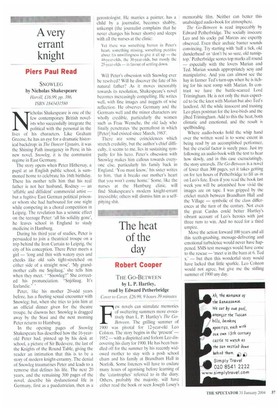Avery errant knight
Piers Paul Read
SNOWLEG by Nicholas Shakespeare Harvill, £16.99, pp. 386, ISBN 1843431580
Nicholas Shakespeare is one of the few contemporary British novelists who successfully integrate the political with the personal in the lives of his characters. Like Graham Greene, he has an eye for a dramatic historical backdrop: in The Dancer Upstairs, it was the Shining Path insurgency in Peru; in his new novel, Snowleg, it is the communist regime in East Germany.
The story opens when Peter Hithersay, a pupil at an English public school, is summoned home to celebrate his 16th birthday. There his mother tells him that his real father is not her husband, Rodney — an 'affable and diffident' commercial artist — but a fugitive East German political prisoner whom she had harboured for one night while competing in a choral competition in Leipzig. The revelation has a seismic effect on the teenage Peter: 'all his solidity gone', he leaves school in England to study medicine in Hamburg.
During his third year of studies, Peter is persuaded to join a theatrical troupe on a trip behind the Iron Curtain to Leipzig, the city of his conception. There Peter meets a girl — `long and thin with watery eyes and cheeks like old sails tight-stretched on either side of a straight nose'. 'My grandmother calls me Snjolaug,' she tells him when they meet. "Snowleg'?" She corrected his pronunciation. "Snjolaug. It's Icelandic." ' Peter, like his mother 20-odd years before, has a fleeting sexual encounter with Snowleg: but, when she tries to join him at an official dinner given for the theatre troupe, he disowns her. Snowleg is dragged away by the Stasi and the next morning Peter returns to Hamburg.
In the opening pages of Snowleg Shakespeare has described how the 16-yearold Peter had, pinned up by his desk at school, a picture of Sir Bedevere, the last of the Knights of the Round Table, giving the reader an intimation that this is to be a story of modern knight-errantry. The denial of Snowleg traumatises Peter and leads to a remorse that defines his life. The next 20 years, and the remaining 300 pages of the novel, describe his dysfunctional life in Germany, first as a paediatrician, then as a
gerontologist. He marries a painter, has a 1 child by a journalist, becomes shabby, unkempt (the journalist complains that he never changes his boxer shorts) and sleeps with all the nurses at the clinic:
Yet there was something barren in Peter's heart, something missing, something punitive about his unwillingness to give it all up — the 40-year-olds, the 30-year-olds, but mostly the 25-year-olds — in favour of settling down.
Will Peter's obsession with Snowleg ever be resolved? Will he discover the fate of his natural father? As it moves inexorably towards its resolution. Shakespeare's novel becomes increasingly compelling. He writes well, with fine images and nuggets of wise reflection. He observes Germany and the Germans well and the minor characters are wholly credible, particularly the women such as Frau Wensche, the old lady who finally penetrates 'the permafrost in which [Peter] had existed since March, 1983'.
There are some coincidences which stretch credulity, but the author's chief difficulty, it seems to me, lies in sustaining sympathy for his hero. Peter's obsession with Snowleg makes him callous towards everyone else, particularly his family back in England. 'You must know,' his sister writes to him. that it breaks our mother's heart that you won't come home.' Some, like the nurses at the Hamburg clinic, will find Shakespeare's modern knight-errant irresistible; others will dismiss him as a selfpitying shit.




























































































 Previous page
Previous page